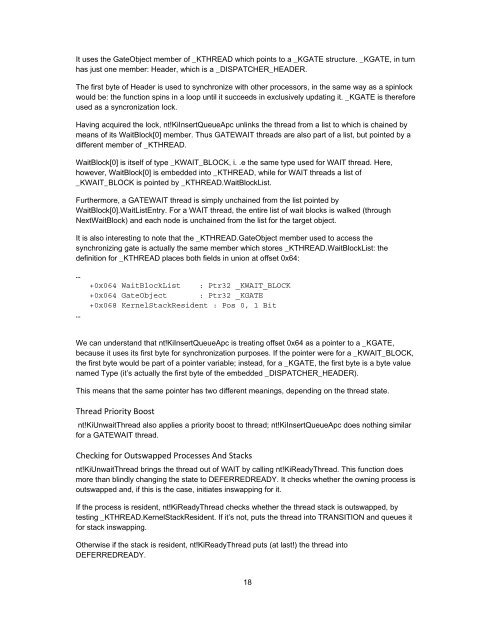366.7 KB - Evernote
366.7 KB - Evernote
366.7 KB - Evernote
You also want an ePaper? Increase the reach of your titles
YUMPU automatically turns print PDFs into web optimized ePapers that Google loves.
It uses the GateObject member of _KTHREAD which points to a _KGATE structure. _KGATE, in turn<br />
has just one member: Header, which is a _DISPATCHER_HEADER.<br />
The first byte of Header is used to synchronize with other processors, in the same way as a spinlock<br />
would be: the function spins in a loop until it succeeds in exclusively updating it. _KGATE is therefore<br />
used as a syncronization lock.<br />
Having acquired the lock, nt!KiInsertQueueApc unlinks the thread from a list to which is chained by<br />
means of its WaitBlock[0] member. Thus GATEWAIT threads are also part of a list, but pointed by a<br />
different member of _KTHREAD.<br />
WaitBlock[0] is itself of type _KWAIT_BLOCK, i. .e the same type used for WAIT thread. Here,<br />
however, WaitBlock[0] is embedded into _KTHREAD, while for WAIT threads a list of<br />
_KWAIT_BLOCK is pointed by _KTHREAD.WaitBlockList.<br />
Furthermore, a GATEWAIT thread is simply unchained from the list pointed by<br />
WaitBlock[0].WaitListEntry. For a WAIT thread, the entire list of wait blocks is walked (through<br />
NextWaitBlock) and each node is unchained from the list for the target object.<br />
It is also interesting to note that the _KTHREAD.GateObject member used to access the<br />
synchronizing gate is actually the same member which stores _KTHREAD.WaitBlockList: the<br />
definition for _KTHREAD places both fields in union at offset 0x64:<br />
…<br />
…<br />
+0x064 WaitBlockList : Ptr32 _KWAIT_BLOCK<br />
+0x064 GateObject : Ptr32 _KGATE<br />
+0x068 KernelStackResident : Pos 0, 1 Bit<br />
We can understand that nt!KiInsertQueueApc is treating offset 0x64 as a pointer to a _KGATE,<br />
because it uses its first byte for synchronization purposes. If the pointer were for a _KWAIT_BLOCK,<br />
the first byte would be part of a pointer variable; instead, for a _KGATE, the first byte is a byte value<br />
named Type (it’s actually the first byte of the embedded _DISPATCHER_HEADER).<br />
This means that the same pointer has two different meanings, depending on the thread state.<br />
Thread Priority Boost<br />
nt!KiUnwaitThread also applies a priority boost to thread; nt!KiInsertQueueApc does nothing similar<br />
for a GATEWAIT thread.<br />
Checking for Outswapped Processes And Stacks<br />
nt!KiUnwaitThread brings the thread out of WAIT by calling nt!KiReadyThread. This function does<br />
more than blindly changing the state to DEFERREDREADY. It checks whether the owning process is<br />
outswapped and, if this is the case, initiates inswapping for it.<br />
If the process is resident, nt!KiReadyThread checks whether the thread stack is outswapped, by<br />
testing _KTHREAD.KernelStackResident. If it’s not, puts the thread into TRANSITION and queues it<br />
for stack inswapping.<br />
Otherwise if the stack is resident, nt!KiReadyThread puts (at last!) the thread into<br />
DEFERREDREADY.<br />
18
















